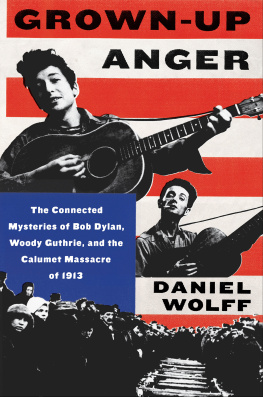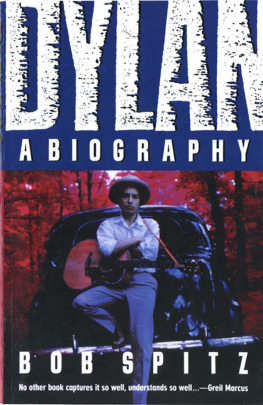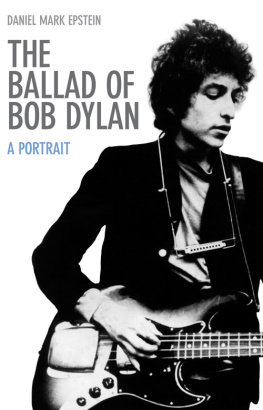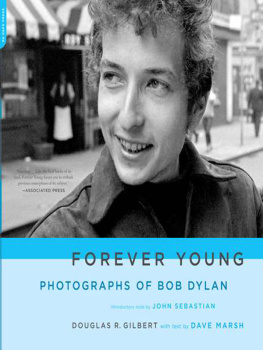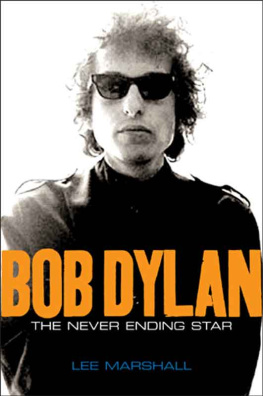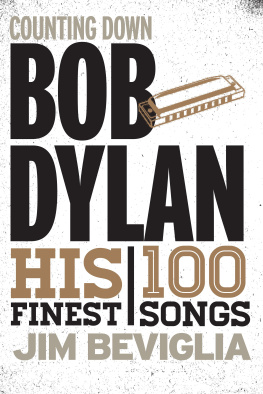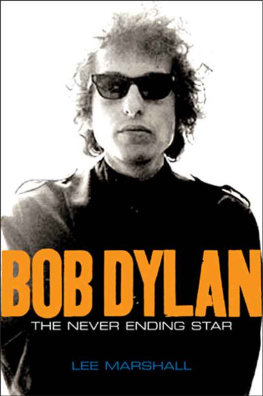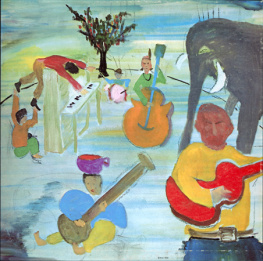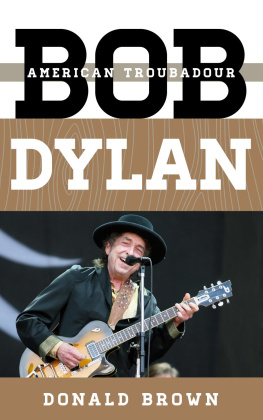
ALSO BY SETH ROGOVOY
The Essential Klezmer: A Music Lovers Guide to Jewish Roots and Soul Music
BOB
DYLAN
PROPHET, MYSTIC, POET
SETH ROGOVOY


SCRIBNER
A Division of Simon & Schuster, Inc.
1230 Avenue of the Americas
New York, NY 10020
www.SimonandSchuster.com
Copyright 2009 by Seth Rogovoy
All rights reserved, including the right to reproduce this book or portions thereof in any form whatsoever. For information address Scribner Subsidiary Rights Department, 1230 Avenue of the Americas, New York, NY 10020.
First Scribner hardcover edition November 2009
SCRIBNER and design are registered trademarks of The Gale Group, Inc., used under license by Simon & Schuster, Inc., the publisher of this work.
For information about special discounts for bulk purchases, please contact Simon & Schuster Special Sales at 1-866-506-1949 or business@simonandschuster.com.
The Simon & Schuster Speakers Bureau can bring authors to your live event. For more information or to book an event contact the Simon & Schuster Speakers Bureau at 1-866-248-3049 or visit our website at www.simonspeakers.com.
Designed by Carla Jayne Jones
Manufactured in the United States of America
10 9 8 7 6 5 4 3 2 1
Library of Congress Control Number: 2009026310
ISBN 978-1-4165-5915-3
ISBN 978-1-4165-5983-2 (ebook)
Permissions acknowledgments appear on pages 299306.
For my mother
Stella Peretz Rogovoy
19382009
May her memory be for a blessing
Make music for Hashem, for He has acted with grandeur; make this known throughout the world. Exult and shout for joy, O inhabitant of Zion, for the Holy One of Israel is great in your midst!
Isaiah 12:56
My word is like fire, says the Lord, and like a hammer that shatters a rock.
Jeremiah 23:29
Those guys are really wise. I tell you, Ive heard gurus and yogis and philosophers and politicians and doctors and lawyers, teachers of all kindsand these rabbis really had something going.
Bob Dylan
Listen, I dont know how Jewish I am, because Ive got blue eyes. My grandparents were from Russia, and going back that far, which one of those women didnt get raped by the Cossacks? So theres plenty of Russian in me, Im sure. Otherwise, I wouldnt be the way I am.
Bob Dylan
A truth thats told with bad intent / Beats all the lies you can invent.
William Blake, Auguries of Innocence
Im exiled, you cant convert me.
Bob Dylan, from We Better Talk This Over
CONTENTS

TERMS AND USAGE

Robert Allen Zimmerman began calling himself Bob Dylan among friends and acquaintances when he started performing at coffee-houses in the Dinkytown section of Minneapolis while still enrolled at the University of Minnesota in 195960. Zimmerman and Dylan are the same person. Some authors have found it cute or clever to refer to Dylan as Zimmerman and vice versa. More nonsense than sense has been made about the name changealthough there is plenty of sense to be made out of it, not the least of which is that Zimmerman was born under the sun sign of Gemini, the twins (a fact that Dylan directly addresses in the song Where Are You Tonight? from the 1978 album Street Legal, when he sings, I fought with my twin / That enemy within / Til both of us fell by the way). Herein Zimmermanwho legally changed his name to Dylan in 1962is called by that name until the period of time during which he began calling himself Dylan and when most of those who knew him knew him as Dylan.
The term Bible as used herein is synonymous with the Hebrew Torah, or, more precisely, Tanakh, which refers to the Five Books of Moses contained in the Torah scroll plus the books of the Hebrew Prophets and the Writings, which include the Psalms and other nonprophetic works (such as Proverbs, the story of Job, the Song of Songs, Lamentations, Ecclesiastes, and, significantly, the concluding book of Chroniclesa title Bob Dylan borrowed for his 2004 memoir).
Some refer to these works as the Old Testament, but such usage puts the Jewish works in the context of the Christian Biblecomposed of most of the Jewish Bible (the Old Testament) and the writings referred to as the New Testamentand thus implies that they have been superseded by the latter, which is insulting to Jews. Thus, its a term shunned herein.
Torah, however, can also be used to mean the complete corpus of Jewish law and scripture, which goes far beyond the Tanakh and includes the Midrash, the Mishnah, the Talmud, the mystical writings, and other works by great sages such as Rashi, Maimonides, and Nachmanides. To study Torah could mean to study any of these works, or even to study modern commentaries on these works. In this sense, Torah can mean the complete body of Jewish learning.
In referring to the Jewish deity, I follow convention in my narrative by writing G-d, an acknowledgment that His name is ineffable, unknown, and should be treated with respect (and not be defaced or erased). In quotations, however, the spelling out of God follows the original publications practice, for example, in Bob Dylans song lyrics.
Jesus is referred to by name, but without the additional term Christ, a word derived from the Greek term kristos, loosely translated as messiah. To append the term Christ after the name of Jesus or to refer to Jesus by that term alone implies acceptance of Jesus as the Messiah foretold by the Jewish prophets.
For the comfort and ease of the general reader, historical names and texts are given in their commonly accepted English forms: thus, for example, the Jewish patriarchs, Avraham, Yitzhak, and Yaakov are called Abraham, Isaac, and Jacob, respectively, and the book in which we read about them is referred to as Genesis instead of its Hebrew title, Bereishis. Likewise, the oft-quoted Prophets Yishayahu, Yirmiyahu, and Yehezkiel are referred to here as Isaiah, Jeremiah, and Ezekiel.
PROLOGUE

ROCKIN THE SHTETL
He decided to raise the level of the entertainer to the dignity of a singer about his people, their life and struggles. With a deep affection and regard for his suffering people, he sang of his times, pointed up the evils, satirized the guilty, stressed the good.
When doing research for a previous book, I stumbled across this passage in the folklorist Ruth Rubins book Voices of a People. Rubin was writing about Eliakum Zunser. Born in Lithuania in 1836, Zunser began his performing career as a traditional badkhn, a folk artist who worked primarily as a wedding emcee in Jewish Eastern Europe, and became a pioneer of original Yiddish protest songs in the 1860s and 1870s, which eventually led to his becoming the most popular Jewish folksinger of his time, by building a new kind of protest music atop a foundation of folk tradition.
A
Next page


